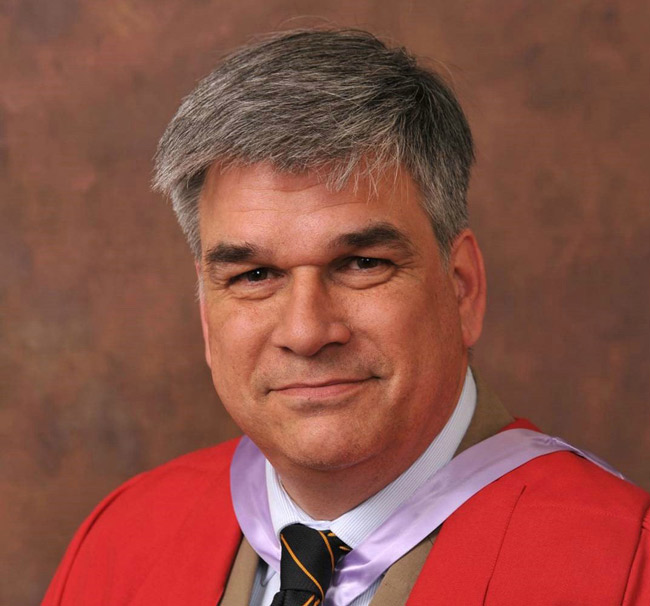
Associate Professor Michael Schultz.
The new Head of the Dunedin Scool of Medicine's Department of Medicine plans to set up a teaching committee, and help shape the future of Otago's health services and main hospital, while also expanding international research exchanges.
But that is just the start of Associate Professor Michael Schultz's vision, which also includes an over-arching ambition to build a culture: “I would love to create a department where people feel they belong and are proud to be part of.”
"The research committee, instituted a couple of years ago, did a tremendous job. I plan to put a teaching committee in place to do just the same."
He has come to the role at the University's Dunedin School of Medicine, from the position of Deputy Head, with what seems like boundless energy. When asked what he wants to accomplish in the first year, he has a strong and considered response.
“The Department of Medicine is in great shape, with a vibrant research and teaching culture, and that's due to the tireless work and dedication of (predecessor) Professor Rob Walker. The research committee, instituted a couple of years ago, did a tremendous job. I plan to put a teaching committee in place to do just the same.”
Social media and reviews
“However, our achievements need to be made visible to future-proof the prosperity of this Department. Very high on the agenda is the improvement of communication using different means — and thanks to my two teenage daughters — will include social media. Be prepared to see the Department regularly using Twitter and Facebook.”
He hopes boosting the Department's visibility as an attractive workplace will help overcome difficulties recruiting joint clinical staff who work across the University and Dunedin Hospital, and attract more postgraduate students from different disciplines — inside and outside medicine — to enhance the Department's research portfolio.
"I will not be able to please everybody but I don't think I lack passion for this job or the department."
Associate Professor Schultz has other concrete opportunities to make changes as well, through the review of the department in August and the review of services midway through next year, which will help shape the Department's future.
“I am 'lucky' that the department is currently being externally reviewed which will give me an opportunity to stock-take and see what needs to happen.”
“I will not be able to please everybody but I don't think I lack passion for this job or the department. The real challenge is to not just do business as usual but to critically look into processes etc. and see what can be changed and improved.”
The Southern District Health Board and teaching - the future
The Associate Professor in Medicine (Gastroenterology) and Consultant Gastroenterologist at the Southern District Health Board believes the future offers plenty of opportunities and challenges, including the health board facing significant changes in both the short and medium-term.
He has no doubt the Department should work side-by-side with the health board and play a proactive role in the scheduled rebuild of Otago and Southland's most sophisticated hospital, Dunedin Hospital.

That construction project will also involve shaping the way health services will be provided around the South in the future.
When it comes to the Department's other major focus, teaching medicine, he wants to work with the new teaching committee to examine modern and innovative ways to teach medical students in the city, and he expects electronic-based learning to take a leading role.
“I want our Department to expand on medical education and shape the teaching philosophy right from ELM2 (second-year medicine) through to PGY2 (second-year postgraduate). Several initiatives are already in the planning stages in the different specialties to make this happen.”
Research and hospital-based training
However, a tightening of the focus on teaching does not signal a lessening of the focus on research: “Talking to overseas alumni, there is plenty of opportunity to enrich the students' experience either with a stint in a research laboratory or just by getting to know different healthcare environments. Vice-versa, we have a lot to offer and should grow our international and national exchange collaborations.”
“Strategically, we need to think about the future of fundamental research in the Department of Medicine. I am sharing the load with Deputy Head of Department Research Associate Professor Rachael Taylor who — as a very successful full-time researcher — will ensure that basic science gets the support and exposure in the Department that it needs.”
"Obstacles need to be removed to allow house surgeons and registrars to experience research to complement their clinical training and finish with a well-recognized degree without jeopardizing their future job prospects within the Southern District Health BoardE."
Great care was put into choosing Associate Professor Taylor for the role and she will work closely with Dr Paul Hessian, chairman of the Research Committee, to ensure research remains a central plank of the Department.
“We need to consolidate the foundations and build on them. A focus will be on the recruitment of joint (hospital and academic) appointments with a strong research background, but also postgraduate students.”
Associate Professor Schultz believes the fact people do not need to be a physician to find a home in the Department of Medicine needs to be more widely known.
He also believes that while not every physician needs to be a researcher, experience in research should be an integral part of practising medicine.
“Working at the Southern District Health Board also means working in a close relationship with the Dunedin School of Medicine. Obstacles need to be removed to allow house surgeons and registrars to experience research to complement their clinical training and finish with a well-recognized degree without jeopardizing their future job prospects within the Southern District Health Board.”
The new position
Asked what attracted him to his new position, Associate Professor Schultz quips that he was given two options and “unbelievably” the Head of Department job was the most attractive.
"I see this position as a great challenge to make a difference and I am greatly honored to have been appointed."
“I see this position as a great challenge to make a difference and I am greatly honored to have been appointed.”
“The department was sold to me as a well-oiled machine with an awesome administrative team but change is required, and I want to be part of it. As director of the Gut Health Network, I had a first-hand taste of a leadership position and I liked it”
“I guess several years on the Executive Committee of the New Zealand Society of Gastroenterology also shaped me.”
He will become President of the Society in November and is aiming to bring the Annual Scientific Meeting to Dunedin again, after a “very successful meeting” involving almost 400 delegates in 2011.
Outside involvements
Associate Professor Schultz is also keen to keep fostering his “great passion” for research, where he has a foot in both camps, patient-based medical research and scientific research.
"I enjoy a great collaboration with several scientists from within and outside the Department of Medicine and we work truly from bench to bedside. I will do my utmost possible to continue this collaboration."
“I enjoy a great collaboration with several scientists from within and outside the Department of Medicine and we work truly from bench to bedside. I will do my utmost possible to continue this collaboration.”
“I have also created a fantastic clinical research unit with a very dedicated team of research nurses and administrators. In the current funding climate this unit is essential to provide my basic research interests with the necessary funding to continue.”
“Besides the monetary benefit — and almost more important — is the fact that we can give our patients access to cutting-edge medicine that would otherwise not be available in New Zealand.”
“As director of the Gut Health Network, I am combining these research interests and we were very successful in creating a network that includes scientists, researchers, clinicians, patient support groups and the pharmaceutical industry to work on 'things that matter'.”
Because one of Associate Professor Schultz's self-confessed weaknesses is an inability to say no, he has also already committed to having a summer student and almost had another PhD student for next year.
At a glance
Training
Employment
1996: Medical degree from the University of Erlangen, Nuremberg, Germany: The effect of physical activity in patients with dilated cardiomyopathy (heart problems).
2005: PhD, University of Regensburg, Germany: Mechanisms of probiotic bacteria
2005: Medical State Board Exam, Gastroenterology, German Medical Council.2013- Associate Professor
2013- Director of the Gut Health Network
2005-2013: Senior Lecturer in Medicine (Gastroenterology) at the University of
Otago and Consultant Gastroenterologist for the Southern District
Health Board
2004-2005: Gastroenterologist, Department of Internal Medicine,
Wasserburg am Inn, German
2012- Director of the Gut Health Network
1998-2004: Clinical and Research Fellow, Department of Internal Medicine I,
University of Regensburg, Germany
1996-1998: Research Fellow, Department of Gastroenterology, Division of
Digestive Diseases, University of North Carolina at Chapel Hill,
United States
1994-1996: House Officer and Senior House Officer, Department of Medicine
Greenwich District Hospital, London, England
1994: House Officer, Department of Medicine, Renal Unit, Withington
Hospital, Manchester, England
Professional Affiliations
Fellow of the Royal Australasian College of Physicians
Member of the NZ Society for Gastroenterology (President-elect)
Member of the German Gastroenterological Association
Member of the German Crohn's and Colitis Foundation
Member of the European Crohn's and Colitis Organisation
Research Expertise
The clinical and basic scientific aspects of Inflammatory Bowel Diseases, with an emphasis on host-microbe interactions.Community Service
Hepatitis C Resource Centre for Otago, Member of the Trust Board
Crohn's and Colitis New Zealand, Medical Advisor
Otago Crohn's and Colitis Support Group, Medical Advisor (until 2015)
Zenith Swimming Club, Member of the Executive Committee (until 2012)
St. Kilda Surf Life Saving Club, Active Patrol Life Guard (on average 25 hours community service a year), Honorary Club Surgeon.